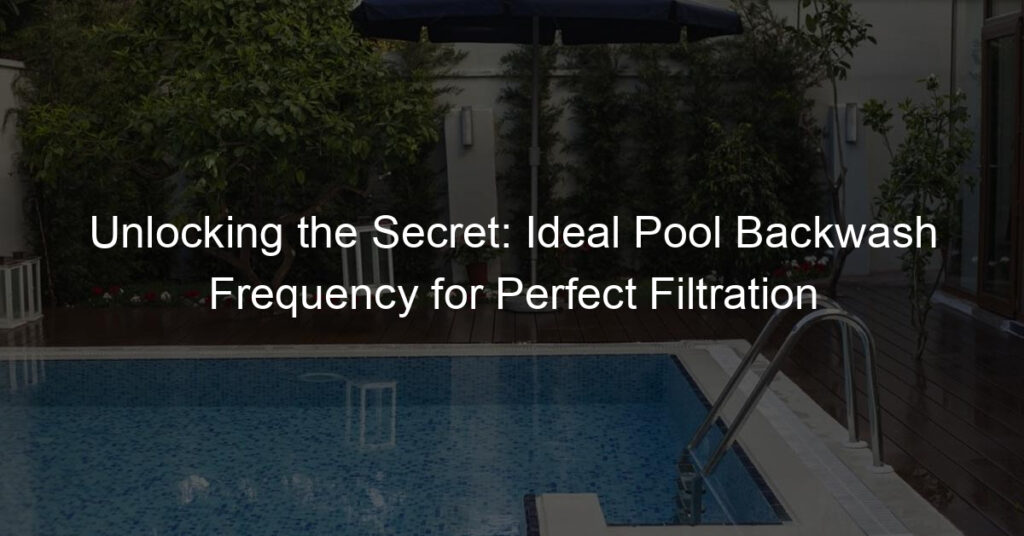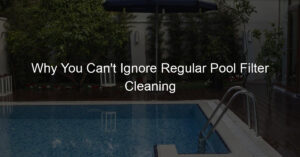
Introduction to Pool Maintenance
Having a swimming pool is a wonderful luxury, but it also comes with its own set of responsibilities. One of the most important tasks for any pool owner is regular pool maintenance. Let’s dive into the importance of pool maintenance, its key elements, and the role of filtration in maintaining pool cleanliness.
-
- Importance of Regular Pool Maintenance
Regular pool maintenance is crucial for several reasons. Firstly, it helps to keep the water clean and safe for swimming. Dirty water can lead to various health issues, including skin and eye infections. Secondly, regular maintenance can extend the lifespan of your pool and its equipment. A well-maintained pool can last for many years, saving you money in the long run. Lastly, it enhances the overall appearance of your pool, making it more inviting for you and your guests.
-
- Key Elements of Pool Maintenance
There are several key elements involved in pool maintenance. These include:
-
-
- Water Testing: This involves checking the pH, chlorine, and alkalinity levels of your pool water to ensure it’s safe for swimming.
- Skimming and Vacuuming: This helps to remove debris from your pool, keeping it clean and clear.
- Filter Cleaning: This is crucial for maintaining water clarity and preventing the growth of bacteria and algae.
- Chemical Balancing: This involves adding necessary chemicals to your pool water to maintain its balance and prevent any potential health risks.
- Role of Filtration in Maintaining Pool Cleanliness
-
The filtration system plays a vital role in maintaining pool cleanliness. It works by circulating water through a filter, which traps and removes dirt, debris, and other contaminants. This helps to keep the water clean and clear, making your pool more enjoyable to swim in. Moreover, a well-functioning filtration system can also help to prevent the growth of algae and bacteria, further enhancing the safety and cleanliness of your pool.
In the following sections, we will delve deeper into understanding pool filtration, pool filter maintenance, and backwashing pool frequency. We will also look at some case studies related to pool maintenance and backwashing. So, stay tuned!
Understanding Pool Filtration
One of the most vital aspects of maintaining a clean and healthy swimming pool is understanding pool filtration. This process is crucial to keeping your pool water clear and free from unwanted debris and contaminants.
What is Pool Filtration?
Pool filtration is a process that involves several components working together to remove impurities from your pool water. Let’s delve deeper into what pool filtration is, how it works, and why it’s so important.
-
- Definition of Pool Filtration
Pool filtration is the method of cleaning pool water by passing it through a filtering system to remove dirt, debris, and other impurities. This process helps maintain the clarity and cleanliness of the water, providing a safe and enjoyable swimming environment.
-
- How Pool Filtration Works
The pool filtration process begins when the pool pump draws water from the pool. This water, filled with potential contaminants, is then pushed through the pool filter. The filter traps and holds the impurities while clean water is returned back into the pool. This cycle repeats, ensuring constant filtration and circulation of the pool water.
-
- Importance of Optimal Pool Filtration
Optimal pool filtration is essential for maintaining a healthy swimming environment. It removes unwanted debris and bacteria, preventing the spread of diseases and maintaining the chemical balance of the water. Without proper filtration, pool water can become cloudy, discolored, and unsafe for swimming.
In conclusion, understanding pool filtration is key to maintaining a clean and safe swimming pool. By ensuring your pool’s filtration system is working optimally, you can enjoy a refreshing and enjoyable swim anytime.
Components of Pool Filtration System
Understanding the components of a pool filtration system is essential for maintaining a clean and healthy swimming pool. Let’s take a closer look at each component.
- Pool Filter
The pool filter is the heart of the filtration system. It is responsible for removing impurities from the water, including dirt, leaves, and even small toys that may have fallen into the pool. There are three main types of pool filters: sand filters, cartridge filters, and diatomaceous earth filters. Each type has its own strengths and weaknesses, but all are designed to keep your pool water clean and clear.
- Pool Pump
The pool pump is the powerhouse that drives the filtration system. It circulates the water in the pool and pushes it through the filter. The pump should be powerful enough to move the entire volume of water in your pool at least once a day. This circulation of water is crucial in distributing the chemicals evenly throughout the pool and keeping the water clean and safe for swimming.
- Skimmers and Return Jets
Skimmers and return jets are the components that help circulate the water in your pool. Skimmers are located around the top of the pool and work by drawing in water (and any floating debris) into the filter. Return jets are the outlets through which clean water is returned back into the pool. They are usually positioned in such a way to create a circular flow of water, helping to distribute chemicals and heat evenly throughout the pool.
In conclusion, understanding the components of your pool’s filtration system is key to maintaining a clean and healthy swimming pool. Regular maintenance and checks on these components can help ensure they are working efficiently and keep your pool in top condition.
Pool Filter Maintenance
Keeping your pool filter in top shape is a crucial aspect of maintaining a clean and healthy swimming pool. Let’s delve into the importance of pool filter cleaning.
Importance of Pool Filter Cleaning
Pool filter cleaning is not just about keeping the water clean; it’s about ensuring the longevity of your pool and the health of those who use it. Here are some key points to consider:
-
- Role of Pool Filter in Water Filtration
The pool filter is the heart of the pool’s filtration system. It works tirelessly to remove impurities, such as dirt, leaves, and even microscopic bacteria, from the water. Without a functioning filter, your pool would quickly become a breeding ground for bacteria and algae, making it unsafe for swimming.
-
- Consequences of a Dirty Pool Filter
A dirty pool filter cannot effectively perform its job. Over time, the buildup of debris can cause the filter to work less efficiently, leading to cloudy water and potential health risks. Furthermore, a clogged filter puts strain on the pool pump, which can lead to costly repairs or replacements.
-
- Benefits of Regular Pool Filter Maintenance
Regular pool filter maintenance ensures that your pool stays clean and safe for swimming. It extends the lifespan of your filter and pool pump, saving you money in the long run. Additionally, a clean filter works more efficiently, using less energy and keeping your pool’s water crystal clear.
In conclusion, regular pool filter maintenance is essential for the health of your pool and those who enjoy it. Stay tuned for our next section, where we’ll guide you through the process of cleaning a pool filter.
How to Clean a Pool Filter
Keeping your pool filter clean is crucial for maintaining a healthy and enjoyable swimming environment. Here, we will guide you through the process of cleaning your pool filter, highlight common mistakes to avoid, and suggest the recommended frequency for pool filter cleaning.
-
- Step-by-step guide to cleaning a pool filter
First, turn off the pool pump and remove the filter. Rinse it with a hose to remove loose debris. Next, prepare a solution of water and a filter cleaner. Soak the filter in this solution for at least 12 hours. After soaking, rinse it again thoroughly. Finally, let it dry completely before reinstalling.
-
- Common mistakes to avoid
One common mistake is not allowing the filter to dry completely before reinstalling it. This can lead to mold and mildew growth. Another mistake is using a pressure washer to clean the filter, which can damage it. It’s also important not to skip the soaking step, as this helps to remove oils and other stubborn debris.
-
- Recommended frequency for pool filter cleaning
How often you should clean your pool filter depends on its type and the amount of use your pool gets. However, a good rule of thumb is to clean cartridge filters every 2-4 weeks, sand filters every 2-4 months, and DE filters every 6 months. Always check the filter’s pressure gauge as a significant increase can indicate it’s time for a cleaning.
| Type of Pool Filter | Recommended Cleaning Frequency |
|---|---|
| Cartridge Filter | Every 2-4 weeks |
| Sand Filter | Every 2-4 months |
| DE Filter | Every 6 months |
Remember, maintaining a clean pool filter not only ensures a pleasant swimming experience but also extends the lifespan of your pool equipment. So, make sure to follow these guidelines and keep your pool filter in top shape.
Backwashing Pool Frequency
One of the key aspects of maintaining a clean and healthy swimming pool is understanding the frequency of backwashing. But before we delve into that, let’s first understand what backwashing is.
What is Backwashing?
Backwashing is a crucial part of pool maintenance. It’s a process that helps keep your pool water clean and clear. Let’s break it down.
- Definition of backwashing: Backwashing is a process where water is pumped backwards through the pool filter to remove any dirt or debris. This reversed flow of water flushes out the grime from the filter, allowing it to function effectively.
- How backwashing contributes to pool water filtration: Without backwashing, your pool filter can become clogged with debris. This can reduce its effectiveness and even damage the filter. By backwashing, you ensure that the filter is clean and can perform its job of removing impurities from the pool water.
- Understanding the pool backwash process: The backwash process is simple. You turn off the pool pump, adjust the valve to the backwash setting, and then turn the pump back on. The water will flow in reverse, cleaning the filter. Once the water runs clear, you turn off the pump, return the valve to its original setting, and turn the pump back on.
Now that we understand what backwashing is and how it contributes to the filtration of pool water, we can discuss how often this process should be carried out. Stay tuned for our next section where we will discuss the ideal backwashing frequency.
Determining the Ideal Backwashing Frequency
Backwashing your pool is a crucial part of maintaining clean and healthy water. However, knowing when and how often to backwash can be a bit tricky. Let’s explore the factors that affect backwashing frequency, signs that your pool needs backwashing, and the recommended frequency for regular pool backwashing.
-
- Factors Affecting Backwashing Frequency
Several factors can influence how often you need to backwash your pool. These include:
-
-
- Pool Usage: Pools that are used frequently or by a large number of people may require more frequent backwashing.
- Type of Filter: Different types of filters may require different backwashing frequencies. Sand filters, for instance, generally need more frequent backwashing than cartridge or diatomaceous earth filters.
- Weather Conditions: Weather conditions like heavy rain or wind can introduce more debris into your pool, necessitating more frequent backwashing.
- Signs That Your Pool Needs Backwashing
-
There are several signs that your pool may need backwashing. These include:
-
-
- Increased Pressure: If the pressure gauge on your pool filter shows a rise of 8-10 pounds per square inch (psi) above the normal operating pressure, it’s time to backwash.
- Cloudy Water: If your pool water is not as clear as usual, it might be a sign that your filter is not working efficiently and needs backwashing.
- Reduced Flow Rate: If water is not flowing through your filter as quickly as it should, this could indicate that the filter is clogged and needs backwashing.
- Recommended Frequency for Regular Pool Backwashing
-
As a general rule, most pool professionals recommend backwashing your pool at least once a month during the swimming season. However, this can vary depending on the factors mentioned above. Always monitor your pool’s condition and adjust your backwashing schedule as necessary.
Remember, backwashing is an essential part of pool maintenance. By understanding the factors that affect backwashing frequency and the signs that your pool needs backwashing, you can ensure your pool stays clean, healthy, and ready for use.
Case Studies: Pool Maintenance and Backwashing
Let’s delve into some real-life examples to better understand the importance of regular pool maintenance and backwashing. These case studies will highlight the impact of these practices on pool water quality and the consequences of neglecting pool filter maintenance.
-
Case Study 1: Impact of Regular Backwashing on Pool Water Quality
Consider the case of a community pool in a suburban neighborhood. The pool was used frequently, especially during the summer months. The pool maintenance team implemented a regular backwashing schedule, ensuring that the pool filter was cleaned every week.
As a result, the pool water maintained a crystal-clear appearance throughout the summer. Water tests revealed that the levels of bacteria and algae were consistently low, indicating high water quality. This case study clearly shows that regular backwashing can significantly improve pool water quality, providing a safe and enjoyable swimming environment.
-
Case Study 2: Consequences of Neglecting Pool Filter Maintenance
On the other hand, let’s look at a hotel pool that was not as diligent with their pool filter maintenance. The pool filter was only cleaned sporadically, and backwashing was not performed on a regular basis.
The consequences were noticeable. The pool water often appeared cloudy, and there were frequent complaints about the water quality from hotel guests. Water tests showed elevated levels of bacteria and algae, which could potentially lead to health issues for swimmers. This case study underscores the importance of regular pool filter maintenance in maintaining water quality and ensuring the satisfaction of pool users.
In conclusion, these case studies highlight the importance of regular pool maintenance and backwashing. By taking care of your pool filter and ensuring regular backwashing, you can maintain high water quality and provide a safe and enjoyable swimming environment.
Conclusion: Swimming Pool Care for Optimal Filtration
As we wrap up this comprehensive guide on pool maintenance, it’s important to revisit some of the key points we’ve discussed. Remember, maintaining your swimming pool is not just about keeping it clean and inviting. It’s also about ensuring the health and safety of those who use it.
-
- Recap of the importance of regular pool maintenance:
Regular pool maintenance is crucial for several reasons. It helps to keep the water clean, clear, and safe for swimming. It also extends the lifespan of your pool and its equipment. Neglecting regular maintenance can lead to costly repairs and health risks. According to a study, 58% of pool owners reported significant savings on repair costs due to regular maintenance.
-
- Key takeaways for maintaining optimal pool filtration:
The pool filter is the heart of your pool’s circulation system. It removes dirt and debris from the water, keeping it clear and safe. Here are the key takeaways for maintaining optimal pool filtration:
-
-
- Regularly check and clean your filter.
- Monitor the pressure gauge to ensure it’s operating within the recommended range.
- Backwash your filter as needed, but not too often as it can damage the filter.
- Replace the filter when necessary. Most filters need to be replaced every 3-5 years.
- Final thoughts on the role of backwashing in pool filter maintenance:
-
Backwashing is a critical part of pool filter maintenance. It helps to clean out the accumulated dirt and debris in the filter, improving its efficiency. However, backwashing should be done judiciously. Overdoing it can lead to water wastage and damage to the filter. As a rule of thumb, backwash your pool filter when the pressure gauge reads 8-10 psi above the starting level.
In conclusion, proper swimming pool care involves regular maintenance, optimal filtration, and judicious backwashing. By following these guidelines, you can enjoy a clean, safe, and inviting pool all year round.














